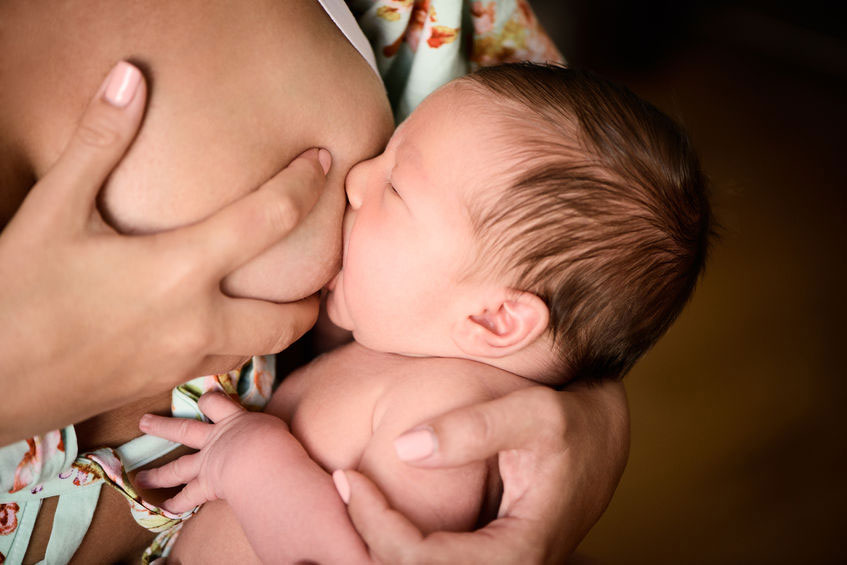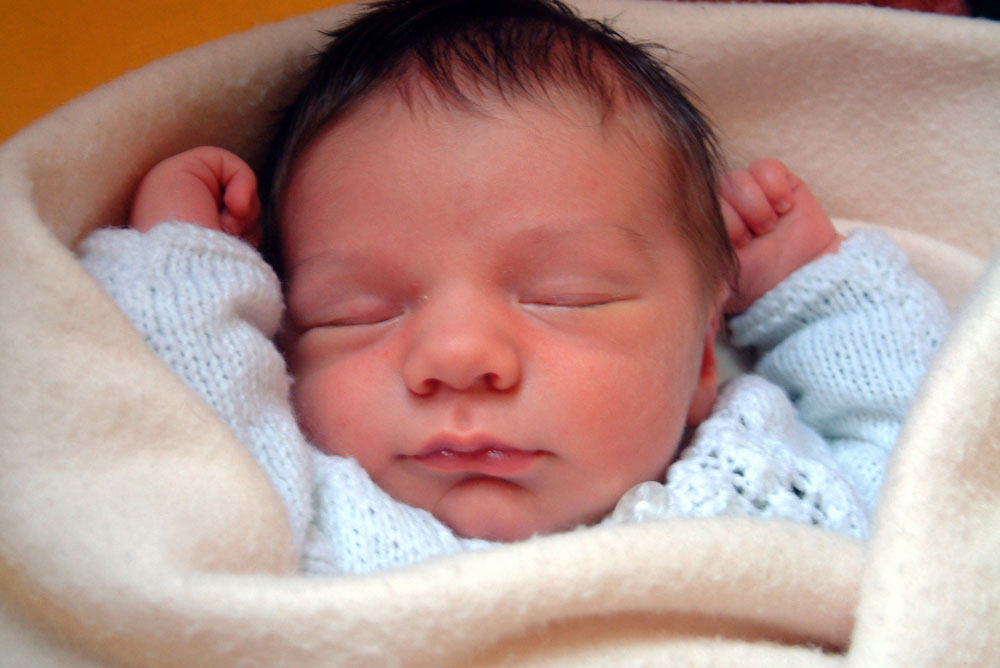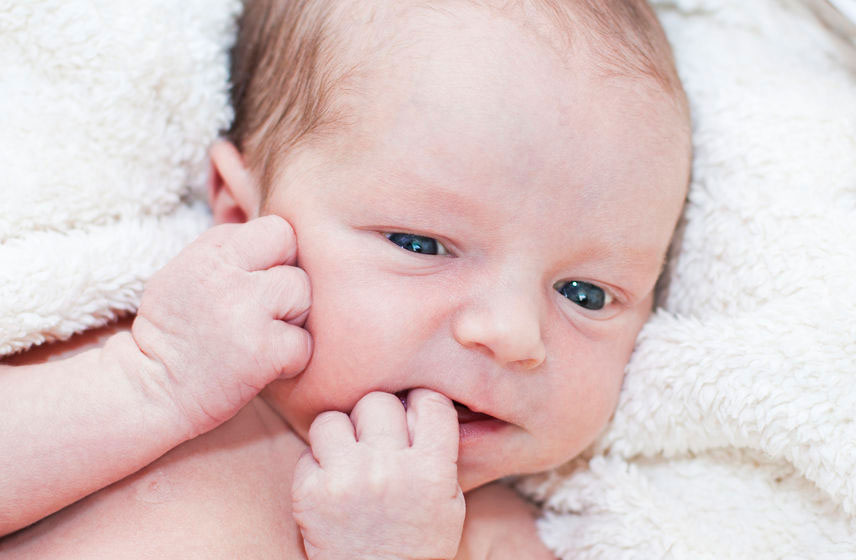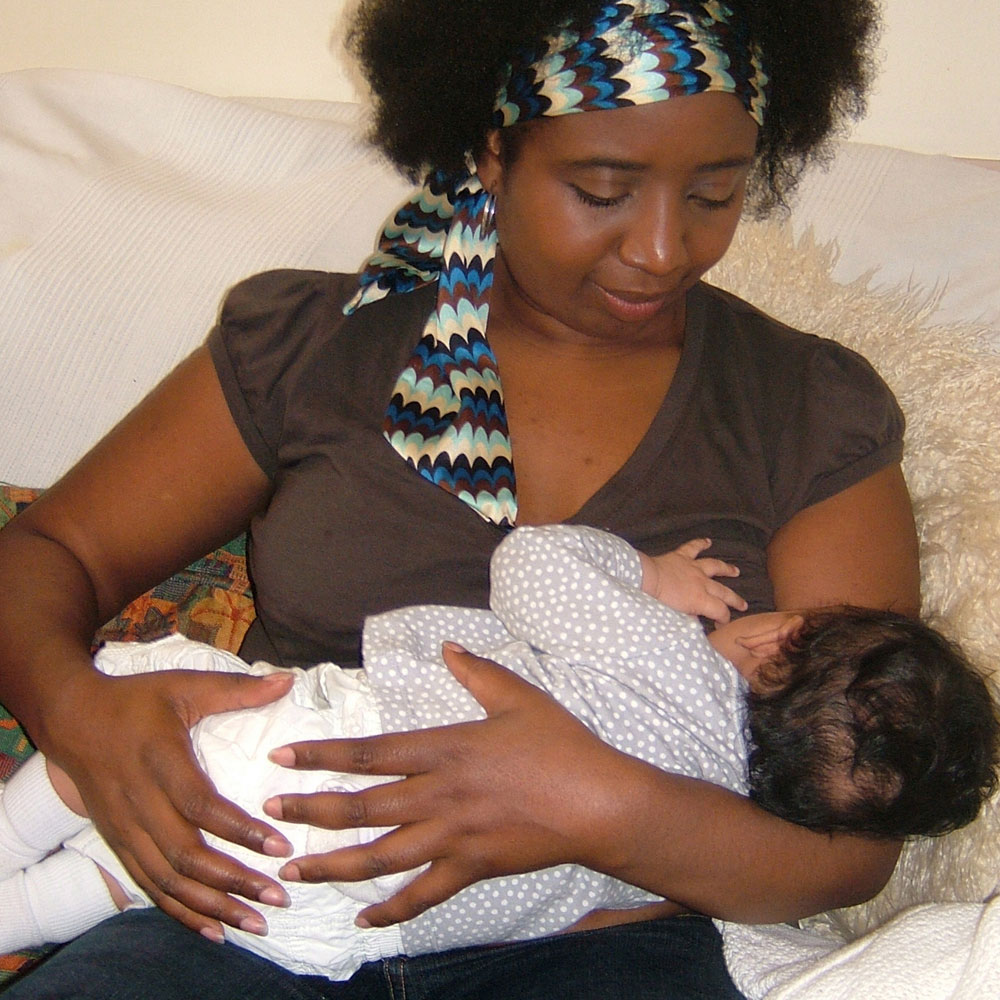A newborn baby spends most of their time sleeping and feeding but how often should a newborn feed? Should you wake a sleeping baby to feed? This article looks at how often babies need breast milk and how much, how to tell if a baby is breastfeeding well, and is a companion article to Breastfeeding a Sleepy Baby.
How often should a newborn feed?
Breast milk is easily and quickly digested—even as quickly as one hour—and babies have tiny tummies so they need to feed little and often. 1 Typically a newborn baby will breastfeed at least 8-12 feeds in 24 hours ie breastfeeding every two to three hours from the start of one feed to the start of the next—which ties in with a newborn’s sleep pattern. Some babies may feed more frequently e.g. every hour at first or they may cluster feed ie have lots of feeds close together at certain times of the day or night. Frequent breastfeeds will provide plenty of breastfeeding practice, provide baby with a steady supply of food and stimulate the breasts to make more milk. Breastfeeding authors and lactation consultants Diana West and Lisa Marasco explain:
It is normal for babies to breastfeed frequently, especially during the early weeks. In the first few days they may nurse as often as hourly; when allowed to do so, mature milk production starts up sooner.
most new babies settle into feeding every 2-3 hours, typically 10 or more times in 24 hours, and may wake more often to feed at night than in the daytime.

Storage capacity
One of the factors affecting how often babies feed is how much milk is available to drink. The milk available is determined by the amount of breast milk stored between feeds (called storage capacity). Different breasts store different amounts of milk. The glandular or “milk making” tissue in a breast controls the storage capacity not the outward size or appearance. One mother may be able to store 3–5oz (90–150ml) of milk in each breast whereas another might store 1–2oz (30–60ml). A mother may also find her own two breasts differ widely in how much milk they each hold. The smaller the amount of breast milk available, the more often a baby will want to breastfeed. Exactly how often or how much a baby is getting at each feed doesn’t matter as long as that baby is able to breastfeed well and whenever he wants. For more information on storage capacity see One Breast or Two Per Feed?
Is colostrum enough for a newborn baby?
Colostrum is the name for the first breast milk that is present before and straight after the birth, it is low in volume but high in protective factors for the baby. Most healthy newborns arrive well nourished and only need small amounts of colostrum until a mother’s milk volume increases (or “comes in”) around the third day after birth. These small volumes are the perfect amount for a healthy newborn to practice breastfeeding. Although a newborn may sleep a lot (particularly in the first 24 hours) and may not need very much milk at a time in the first few days and nights of life, breast milk is quickly digested and babies still need to feed every two to three hours or more often.

How long will my baby sleep?
As discussed above, how long a newborn baby might sleep or wake to feed will depend on how much milk they can get during a breastfeed and how many feeds in total they get during any given 24 hour period. Babies tend to sleep for two or three hours at a time and then wake to breastfeed.2 Some babies may have one longer sleep of four to five hours in a 24 hour period3 particularly as they approach three months of age (BASIS, 2023).
Sleepy baby
Some babies can be particularly sleepy and this could negatively affect their feeds and weight gain. If this is the case for your baby you may need to encourage them to feed every two to three hours. The Womanly Art of Breastfeeding explains:
If you left the hospital still struggling with a medicated or very sleepy baby, assume he’ll need to eat at least every three hours, and more likely every two hours, through much of the day, and at least a couple of times through the night.
If your baby is difficult to wake to feed or falling asleep as soon as they start breastfeeding, see Breastfeeding a Sleepy Baby. If you have any concerns especially if your sleepy baby isn’t gaining weight as expected, speak to your health professional.
When should I breastfeed my baby?
Babies can tell us when they are ready to feed by giving hunger or feeding cues. A baby’s feeding cues can be quite subtle such as:
- moving, fidgeting or fussing
- sucking their fingers or fists
- opening their mouths and turning their head to search for the breast (rooting)
- crying (a late hunger cue).
Babies are more likely to breastfeed when they are in light sleep (eyes moving under their eyelids/or starting to fidget) and/or showing hunger cues.

How can I tell if my baby is feeding well?
Although babies can feed well in light sleep4, just because a sleepy baby is attached to the breast (“latched”) this is not a guarantee that they are drinking well. It’s important to be able to distinguish active feeding from flutter sucking and comfort nursing. When a baby is feeding actively, even if they look like they are asleep, the baby’s jaw will move as they suck and they will swallow regularly e.g. in a pattern of one or two sucks per swallow for 10-15 minutes or more at a time from one or both breasts. The length of time a baby is attached to the breast is not as important as how effectively that baby is feeding. Even if a baby is latched on for an hour, if he isn’t feeding actively with plenty of swallows of milk he might not be getting enough milk. An IBCLC lactation consultant can help you assess how well your baby is feeding if you’re not sure.
Latch is important
A baby’s attachment at the breast (latch) affects how easily they can keep milk flowing during a breastfeed. If a baby is mostly sucking on the nipple without a big mouthful of breast tissue, he is more likely to fall asleep after the initial let-down when the flow slows, and breastfeeding is more likely to hurt. Flat, inverted or large nipples can make it more difficult for a baby to get a good latch and a baby with a tongue-tie might find it difficult to feed effectively. See Latching Tips for ideas to help your baby get a deeper latch and contact a breastfeeding specialist if you need help. Pain, sore nipples, and prolonged engorgement are signs that you may need help with breastfeeding.

How can I tell if my baby is getting enough milk?
Although we can’t see how much breast milk a baby has taken from a breast, knowing how to spot active feeding, listening for swallows of milk, monitoring your baby’s dirty nappies, and weighing your baby regularly will all help confirm they are getting enough milk. For more information on gauging your baby’s milk intake see Is My Baby Getting Enough Milk? Breastfed Baby Poop and Understanding Your Baby’s Weight Chart.
- Listen for swallows. Is your baby feeding actively?
- Check dirty nappies. Are you seeing at least three dirty nappies with soft mustard coloured poop by day four or five?
- Weigh your baby. Check your baby’s weight regularly. If they are not gaining appropriate amounts of weight they may need help to get the milk they need.
The following video from Global Health Media discusses how to tell your baby is getting enough milk including how to tell your baby is drinking well at the breast (skip to two minutes in to see effective sucking and swallowing).
Baby not gaining weight
Although many babies lose a little weight at first, normal weight gain after the first few days of life is 30–40g (1oz) per day. If your baby is finding breastfeeding difficult or is sleepy and not gaining weight—or very little—keeping him well fed is often the key to him getting better at breastfeeding and being less sleepy. An intense pumping routine will both protect your milk supply and provide a breast milk supplement to feed him. Urgent breastfeeding support from a breastfeeding specialist can check whether attachment, positioning, tongue function or other reasons for low milk supply are involved.
Take action sooner rather than later
The sooner you can turn things around the quicker breastfeeding can get back on track. If a baby is sleepy or not breastfeeding well, there is no advantage to just keep weighing him without taking action in the hope that their weight will miraculously pick up on its own. To get changes you will likely have to make changes. Sometimes simply improving the latch and position, using both breasts per feed, using breast compressions and reminding a sleepy baby to breastfeed every couple of hours will be enough. If this doesn’t improve weight gain within 24-48 hours however, an intense routine of pumping and topping up to satiety after breastfeeds can turn things around quickly see Baby Not Gaining Weight and Supplementing an Underweight Baby for much more information.
How much milk do newborn babies need?
A rough guide to the amount of milk a newborn baby might need every two to three hours is copied below. The amounts change as baby grows and may fluctuate daily with growth spurts or periods of illness. Some babies may need more or less than these amounts. Although we can’t see how much milk a breastfed baby is getting direct from the breast; feeding well on demand (at least 8–12 feeds in 24 hours), having plenty of wet and dirty nappies, and gaining 30–40g (1oz) per day in the first three months are good signs of getting plenty of milk.
- First 24 hours: 2–10ml breast milk per feed 5
- 24-48 hours: 5–15ml breast milk per feed (ABM, 2017)
- 48-72 hours: 15–30ml (o.5–1oz) breast milk per feed (ABM, 2017)
- 72-96 hours: 30–60ml (1–2oz) breast milk per feed (ABM, 2017)
- 2-3 weeks: 60–90ml+ (2–3oz+) breast milk per feed 6
- 1-6 months: 90–150ml (3–5oz) breast milk per feed or a total of 750–1035ml per day (25–35oz) (Mohrbacher, 2010)
Summary
Babies feed frequently because they have small tummies, breast milk is quickly digested and they need to feed a lot in order to double their weight in the first four to six months of life. Exactly how often a baby breastfeeds doesn’t matter as long as they are fed frequently on demand (at least 8–12 times in 24 hours) and they are getting the milk they need to grow. There are lots of ways to tell if a breastfed baby is getting enough milk without measuring the volume. A newborn baby should feed as often as they want to!